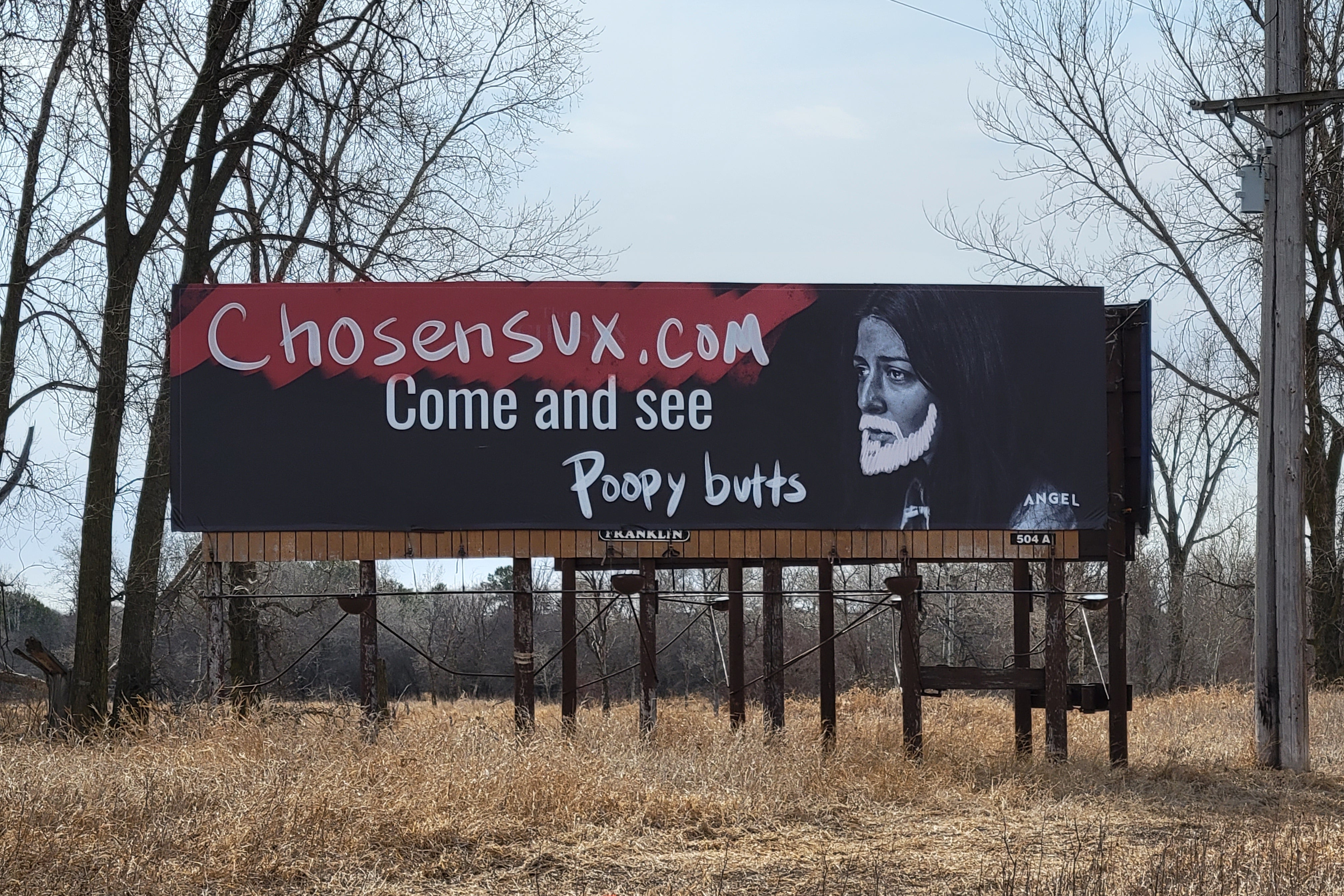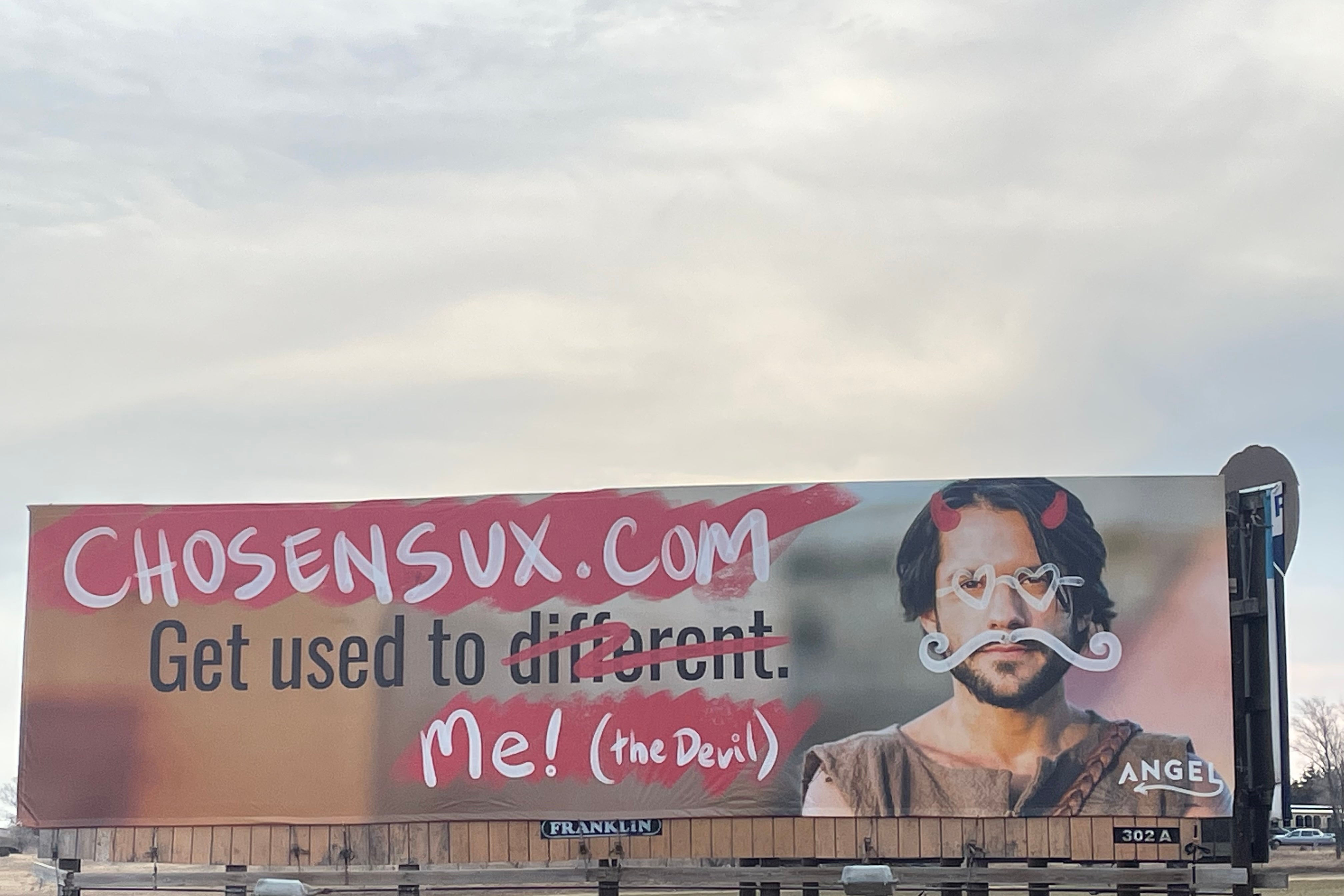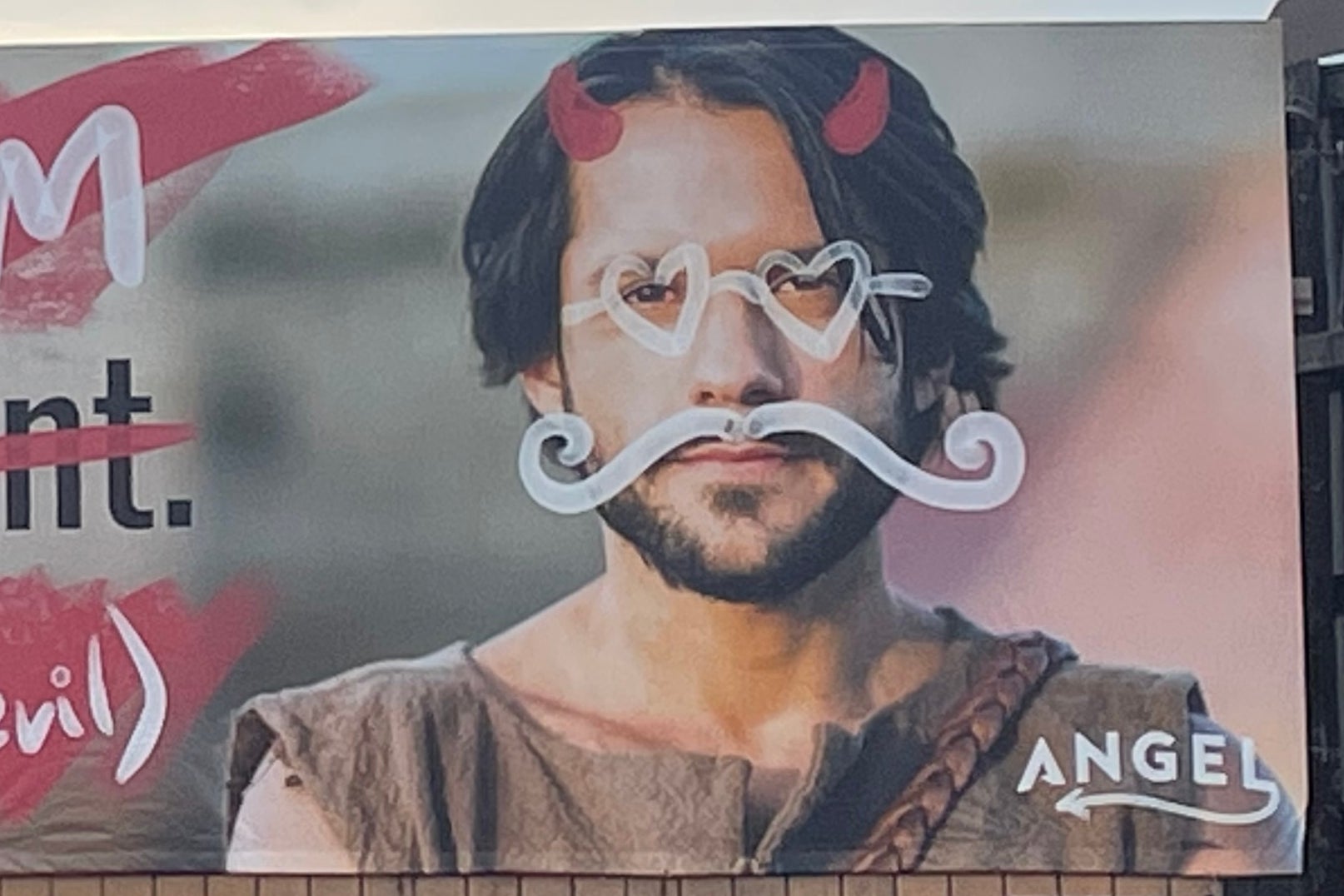In a Facebook livestream on April 13, the director of a Christian television show apologized to his audience for a “big mistake” he had made. “I screwed up, and there’s no excuse for it,” he said. “I was wrong, and I want to genuinely ask for your forgiveness.”
The reason for his apology? An apparent outbreak of vandalism against billboards advertising his show, The Chosen, which follows the lives of Jesus and his disciples.
On one billboard, an image of the actor who plays Jesus was defaced with a mustache and sunglasses. On another, “Chosensux.com” was scrawled in red and white, attributed to “(the Devil).” Another billboard had graffiti that called The Chosen “boring,” while another altered the line “Binge Jesus” to “Binge kale (eww).”
All of the graffiti was suspiciously polished and mild in tone—the most off-color addition was the phrase “poopy butts”—and all of the billboards directed the viewers to marketing for the show. (The website chosensux.com directs the viewer to an ad campaign from the perspective of the devil, who simply hates The Chosen for being so much less lame than other Christian TV shows.)

In other words, the billboards were faux vandalized. And this marketing decision really hit a nerve.
“Our core fans, when they first saw those billboards, got really upset,” the show’s creator, Dallas Jenkins, said in an interview last week. “They were calling billboard companies and going online to really criticize the dastardly people behind it.”
Jenkins said he had meant no harm. But fans were still angry. “I honestly feel like it’s making a mockery of Jesus,” one person wrote on Facebook.
“You guys missed the mark on this,” another wrote. “The billboards are distracting, evil, and wrong. The Lord would not stoop to cheap gimmicks to promote His Good News, His Gospel.”
The most vehement comments came from those who had been fooled by the graffiti and thought that the billboards had actually been defaced. “This is blasphemy to Gods work,” one person wrote on Facebook. “The Chosen series without a doubt is Gods plan.”
Another wrote: “I saw the billboard before I knew what it was. I was furious beyond words. I cried for our world so lost that this was done.”
It was an interesting turn of events for the creators of this massive yet underground franchise, who either underestimated—or savvily played upon—Christian ideas about religious persecution.
A 2021 PRRI survey of more than 1,000 Americans found that nearly 60 percent of white evangelicals said they believe there is a lot of religious discrimination against Christians. Less than half said the same about Muslims; an even smaller percentage said the same thing about Black Americans. The Chosen’s Christian audience is already primed to believe that any Christian content would be subject to attack.
It’s possible Jenkins didn’t foresee the strong reaction. The Chosen isn’t just for white evangelicals, after all. It appears to be popular among mainline Protestants, Catholics, and even Latter-day Saints (the faith-based streaming company Angel Studios, which released The Chosen, was founded by a Latter-day Saint). Non-evangelical Christians and evangelicals of color are significantly less inclined to see signs of widespread Christian persecution.
But Jenkins, an evangelical, should be very familiar with how Christian audiences feel about popular religious content. His father, Jerry B. Jenkins, co-authored the wildly successful Left Behind series, which depicts born-again Christians, left on Earth after the rapture, battling the forces of the Antichrist amid the horrors of the biblical apocalypse.
Possibly from his father’s example, Dallas Jenkins learned that a Christian product needs to combat perceptions of Christian fiction by highlighting drama and toning down preachiness (in one ad for the show, the devil said he was trying to tank The Chosen’s viewership by having mothers recommend it to their children). It also needs to court a bit of scandal.

The Chosen is undeniably a huge success. The show, which debuted in 2019 and can be streamed on an app or on Amazon Prime or Peacock, is billed as the most successful crowdfunded media project ever, with over $40 million in donations and investments. At one point last year, more than 2,000 people paid $1,000 each to be an extra in a scene filmed in Midlothian, Texas, that depicted the Sermon on the Mount. The creators claim that the show’s 16 episodes—it started filming its third season on Sunday—have a cumulative 350 million views so far.
The fact that the blockbuster numbers and viewing parties and Game of Thrones–level budget haven’t made more of a splash in the broader pop culture landscape has, in the mind of many Christians, validated their perception that they are scorned by secular culture. But Jenkins clearly doesn’t see things that way. In an interview with Banfield, an interview show on the subscription network NewsNation, he was asked why production companies didn’t go for more religious programming, given the show’s success.
Instead of blasting the godless media, Jenkins just said that religious shows simply tend to fail.
“Some fans of The Chosen think it’s a stick-it-to Hollywood thing,” he told the Wall Street Journal in November. “They get excited about the outside nature of it. But most of our actors and crew are from Hollywood, and Hollywood gave me an opportunity before, but it didn’t work out.”
So did Jenkins really make a “big mistake” with those billboards? A number of Christian and local news outlets have given the show free publicity by writing up the controversy. And according to Jenkins, viewership of The Chosen has “skyrocketed” since the ad campaign started on April 12. “I had to do a little bit of sincere apologizing because I think we missed the boat with our core fans,” Jenkins said in the interview on Banfield. “But the reaction from nonviewers, from people who are just discovering the show because of the campaign, has been actually extraordinary.”
